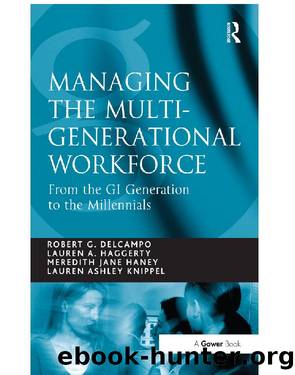Managing the Multi-Generational Workforce by Robert G. DelCampo & Lauren A. Haggerty & Meredith Jane Haney & Lauren Ashley Knippel

Author:Robert G. DelCampo & Lauren A. Haggerty & Meredith Jane Haney & Lauren Ashley Knippel
Language: eng
Format: epub
Publisher: Routledge
Dynamic Nature of the Psychological Contract
Also of note is the dynamic nature of the psychological contract. Changes in the contract over time can be related to fairness, however unagreed changes could have positive outcomes while still terming the contract as âviolated.â For example, oneâs beliefs about an employerâs obligations when they begin work will differ greatly from their beliefs after one year, two years, or three years of employment (Robinson, Kraatz & Rousseau 1994, Rousseau & Anton 1988, Rousseau 1990, Rousseau & Anton 1991). Robinson, Kraatz & Rousseau (1994) found that during the first two years of employment, employees felt they owed less to their employers and the employers owed the employees more. In the end, it was shown that an employerâs failure to fulfill its commitments is significantly associated with decline in some types of employee commitments.
While Guest (1998), Rousseau (1998) and Rousseau & Tijoriwala (1996) all posit that the âgreatest goodâ might arise from research in content-oriented research, it seems that features and moreover evaluation of the contract are the concepts of true value. The problematic idiosyncratic nature of the work agreement does not lend itself to an overarching taxonomy of psychological contract content. Rousseau (2001) and Rousseau & Schalk (2001) demonstrate this predicament as they have begun to propose theories of the âidiosyncratic work agreementâ going so far as to state that the more idiosyncratic or individualized the agreement becomes, the more positive the outcomes (such as commitment, satisfaction, OCBs, and so on) will become. Further work in feature-oriented psychological contract research will provide more insight as to how the agreement is communicated, what methods of communication are most beneficial, and so on. In this vein, practicing managers/organizational agents can adapt their method of communication to match that which is associated with positive outcomes. However, evaluation-oriented research can be a most intriguing source of knowledge regarding the psychological contract since it can easily be causally related to individual level outcomes. As an individual-level phenomenon, researchers (and managers) seek to find impact of intact/fair psychological contracts.
Download
This site does not store any files on its server. We only index and link to content provided by other sites. Please contact the content providers to delete copyright contents if any and email us, we'll remove relevant links or contents immediately.
| Conflict Resolution & Mediation | Human Resources & Personnel Management |
| Knowledge Capital | Outsourcing |
Bullshit Jobs by David Graeber(3173)
Radical Candor by Kim Scott(2210)
I Am Right, You Are Wrong by Edward De Bono(2106)
23:27 by H. L. Roberts(1889)
Nomadland by Jessica Bruder(1680)
Average Is Over by Tyler Cowen(1539)
High-Impact Interview Questions by Victoria A. Hoevemeyer(1402)
Out of Our Minds: Learning to Be Creative by Ken Robinson(1375)
The Conflict Resolution Phrase Book by Barbara Mitchell & Cornelia Gamlem(1340)
The Ideal Team Player by Patrick M. Lencioni(1313)
The Asshole Survival Guide by Robert I. Sutton(1275)
An Everyone Culture: Becoming a Deliberately Developmental Organization by Robert Kegan & Lisa Laskow Lahey(1274)
Automatic Society by Bernard Stiegler(1217)
Unleashed by Anne Morriss & Frances Frei(1216)
Who by Street Randy & Smart Geoff(1194)
42 Rules of Employee Engagement by Susan Stamm(1187)
Who Moved My Cheese?: An Amazing Way to Deal With Change in Your Work and in Your Life by Johnson Spencer(1175)
96 Great Interview Questions to Ask Before You Hire by Paul Falcone(1129)
The Power of Disability by Al Etmanski(1079)
